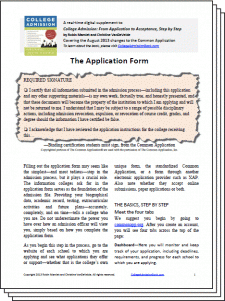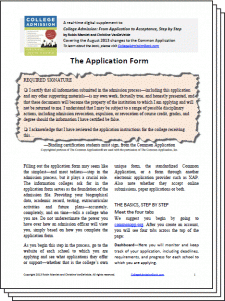A Month-by-Month Checklist for Seniors
Posted on Thu, 09/18/2014 - 11:13We're talking essays, financial aid and more with the Today Show's Jean Chatzky in The College Countdown: A month-by-month to-do list for high school seniors.

We're talking essays, financial aid and more with the Today Show's Jean Chatzky in The College Countdown: A month-by-month to-do list for high school seniors.

The Common Application goes live next week -- on Friday, August 1! So we're bringing you a real-time digital supplement to College Admission: From Application to Acceptance, Step by Step -- our completely revised and updated guide to The Application Form .
It's a complete guide to filling out the college application, which serves as the cornerstone of a student's admission file, including:

Hello, second semester, senior year. After the last few months discussing college applications, the focus now shifts to financial aid applications.
Parents often ask whether these applications are worth the time and trouble. My short answer: Yes. These applications offer the possibility of funding a college education -- grants, loans, and scholarships. (A number of colleges use the FAFSA and CSS College Profile along with the student’s file to determine merit awards or scholarships.)
As Michelle Obama recently said to northern Virginia high school students and their parents, “Don’t leave money on the table.”
The applications
FAFSA—Every college, from a local community college to a very selective private college, requires the Free Application for Federal Student Aid. The FAFSA determines a student’s eligibility for any federal aid, whether grants, subsidized loans, or work-study funds. The application is free; the 2014-15 school year version became available January 1, 2014.

It's here -- our completely revised and updated guide, The Application Form, a real-time digital supplement to College Admission: From Application to Acceptance, Step by Step.
It's a complete guide to filling out the college application, which serves as the cornerstone of a student's admission file, including:
Download your complete free copy here.

John Carpenter is back this month to commiserate with those students who are at heart procrastinators. In other words, those students who have not completed their applications yet. Read on to share the insights of a fellow travel in procrastination land and get inspired. Regardless of your disposition, the time is now!
It’s the holidays. You’re on break. Time to sleep in every single day if you want. And if you’re like many high school students, you still have some work to do on finishing college applications. I get it—I procrastinate, too, and it’s not as bad as everyone says it is. But there are some real advantages to getting things done early, and of course, those of you who are FINISHED and have submitted applications know this already. But this post is not for you.
For you, those who get everything done ahead of time, congratulations. We procrastinators wish we were more like you, but we’re not. We try. And sometimes we even get better, but the truth is that many of us will always put things off to the very end.
So, if you’re one of those finally getting around to getting your apps finished, good for you.

October is the cruelest month for high school college counselors, besieged on all sides with seniors intent on applications and juniors beginning their college search and testing -- as well as issues with the Common App this year. So we give counselors a pass at this time of year. Instead of our Counselor of the Month feature, we bring you a round-up of best advice from the counselors who have graced our website with their guidance and wisdom in the past year. Read on to learn their best advice for students and parents, recommendations for financial aid, guidance on the college search and mistakes to avoid. One of our personal favorite sound bites? Niles West High School's Dan Gin who advises students, "Have fun… Everything will work out in the end." Next year at this time, you'll all see how true this is. In the meantime, take advantage of this advice from the experts on the college counseling side of the desk.
The College Search
Laura Stewart, Ensworth School, Nashville, Tennessee
How do you encourage your students to broaden their college search and look beyond the four or five schools that they know best?

Dr. StrangeCollege, aka Jane Kulow (one of our favorite guest bloggers), has some straightforward, actionable advice on her blog today for students who are applying early and experiencing struggles with the Common Application -- "Got Common App problems? Here's what we're trying." Her three-point plan includes advice from Virginia counselor Nancy Griesemer, who has been on top of the Common App complications from the beginning, as well as a link to our real-time digital supplement on how the application form works, including the August changes to the Common Application. (Available as a free download here, too.) It also includes our most well-loved advice: Check the website of each college to which you are applying. Many schools are pushing back early deadlines or offering alternatives such as the Universal College Application or paper submissions.

It's not too soon to begin to keep track of deadlines for your applications, essays, financial aid, letters of recommendation, interviews and any other special requirements such as arts portfolios. Deadlines are important in the college application process. You do not want to miss out on financial aid, housing or even a seat at one of your top colleges by failing to submit information on time. Use whatever method feels easiest for you -- that might be an Excel spreadsheet, an electronic to-do list, a day planner, desk calendar or designated notebook. You can find our Application Deadline Organizer and Financial Aid Deadline Organizer available for download here in both Word and Excel. Whatever method you decide on, update it faithfully and consult it frequently to keep yourself on track for a successful admission process.
We're back! With our weekly reminders for seniors. Each week, we'll be providing information, checklist items and advice on applying to college -- testing, essays, deadlines, college visits, letters of recommendation and more.
First up? Seniors, get your applications.
Visit the websites of every college to which you will apply and find out what application form they support -- the college's own unique form, the Common Application, Universal College Application, or some other electronic application provider.
Download or obtain any university's unique forms (public universities often have their own forms) and if you are applying to schools that use the Common Application or another electronic provider, go ahead and register and create an account.
No need to complete the applications at this point. Just familiarize yourself with the forms and requirements, including deadlines and any supplemental material that you may need to submit. This way you will understand what is ahead of you and can begin to pull together the information required, as well as start budgeting your time accordingly.

College application deadlines generally cluster around the same time, depending on the type of school and the decision plan a student has selected. Hopefully by now you have checked the website of every college to which you are applying, since deadlines can vary from school to school and may be confusing. For example, some colleges have a supplement deadline prior to their Common Application deadline.
Our best advice? Do not wait until the last minute to submit your forms. Many colleges shut down completely between Christmas and New Year’s. If you run into problems, the admission office will not be open to advise you. So plan accordingly.
And if you insist on taking it down to the wire, be aware that on the Common Application, all time stamps are in the United States Eastern time zone, which is where Common Application offices are located. Also, all deadlines are automatically set as 11:59 p.m. This means that if you are filing from Seattle on January 1, with a January 1 deadline, you will need to submit your application no later than 8:59 p.m. Pacific time. Colleges do have the latitude to extend their deadlines to their own local time, and many do. (If you are using another form or electronic provider, check to see how they time- stamp their applications.) Your safest bet is to use U.S. Eastern time as your standard.
Actually, your safest bet is to submit each of your applications well before the clock strikes midnight on the due date.